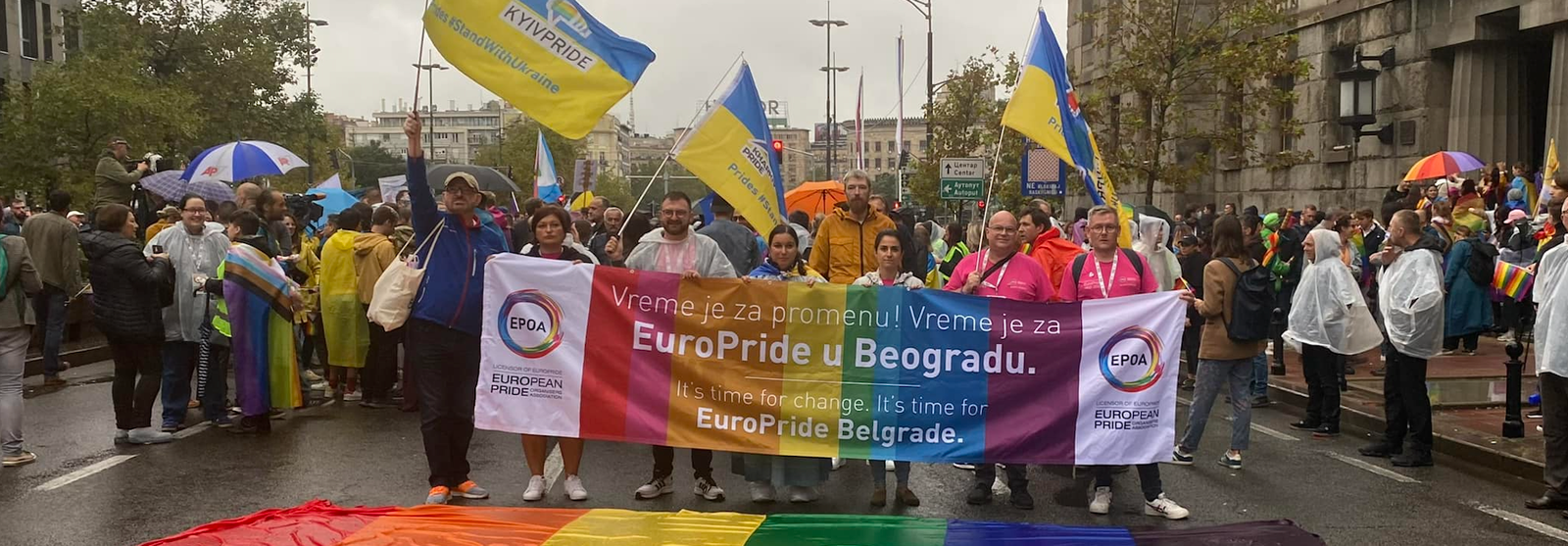Belgrade, Sunday 18 September 2022
The European Pride Organisers Association (EPOA), which licenses EuroPride to a different city each year, has hailed Belgrade EuroPride’s success and described it as the most important in the event’s 30 year history.
EuroPride Belgrade – hosted by local organisation Belgrade Pride – ran from Monday 12 September when the rainbow flag was raised at the Palace of Serbia. More than 120 events took place throughout the week, culminating in the EuroPride March on Saturday 17 September followed by a closing concert. An estimated 7,000 people took part in the EuroPride March.
Representatives of more than 50 Pride organisations were represented in the EuroPride March, many from Europe but also from Canada and Australia, and leaders of the international network InterPride. Dozens of diplomats, Members of the European Parliament, and EU Commissioner Helena Dalli also participated.
The last three weeks have been tumultuous. In late August, Serbia’s President Vučić said that EuroPride was ‘cancelled’. Belgrade Pride and EPOA immediately challenged this, and
confirmed it was not cancelled and all events were going ahead. Protests led by the Orthodox church and nationalist groups took place in Belgrade after Vučić’s statement. Then during EuroPride week,
police officially banned the route of the march, but not the march itself. A new route could not be applied for because of a time limit.
But then, on the day of the EuroPride March, Prime Minister
Ana Brnabić said she was personally authorising the March and that she could “guarantee the safety of everyone on the streets of Belgrade today”. More than 7,000 police were drafted on to the streets with riots taking over much of the city as the March took place peacefully.
Sadly, Brnabić’s promise of safety could not be upheld. Several activists were attacked as they left the closing concert, despite a heavy police presence. One participant was attacked at an LGBTI+ venue, and investigations are ongoing. Police report more than 60 arrests related to protests.
Kristine Garina, President of the Association, said today:
“When our members voted three years ago for Belgrade to host EuroPride we knew there would be struggles and huge opposition. But that is why EuroPride is so important, and it can have a transformative effect on a city and its LGBTI+ community. When
EuroPride began in London in 1992, Belgrade was the capital of Yugoslavia, a country falling apart and descending into civil war. That the 30th anniversary EuroPride could be held here shows the power of our movement.”
“We must acknowledge that the difficulties organisers faced in recent weeks was caused by inflammatory remarks made by the Serbian President, and then a failure of the Prime Minister and police to respect basic freedoms and rights. The eleventh hour reprieve from the Prime Minister yesterday was too little, too late. She can now show leadership by ensuring that all those who attacked our participants are brought to justice.”
“EuroPride in Belgrade will go down in history as a turning point for LGBTI+ equality in Serbia and the wider Western Balkans region. We showed that Pride is not a threat to anyone, and whilst we marched peacefully, it was the far right, nationalists and fundamentalist Christians who battled police.”
“I congratulate Belgrade Pride and everyone who participated on an outstanding event.”
The European Pride Organisers Association will hold its annual conference in Torino, Italy, in early October where Belgrade Pride will report on the event, and members will select the host of
EuroPride in 2025. Next year’s host is
Malta Pride.
EPOA thanks designer Camilla Engelby for designing the banner we carried in the Parade and which has appeared in media across the world. This will be donated to a museum in due course.


